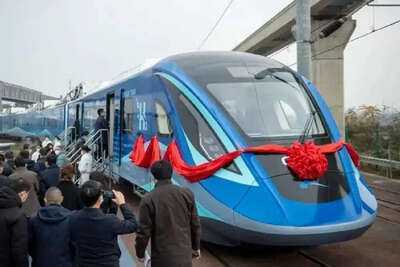
India’s Green Revolution in Railways: Hydrogen-Powered Train Ready for Trial
India is making a major leap in sustainable transportation with the introduction of its first hydrogen-powered train, marking a significant milestone in the country’s railway modernization efforts. The train is set to undergo a trial run on the Jind-Sonipat route in Haryana, achieving a top speed of 110 km/h. This eco-friendly initiative aligns with Indian Railways' goal to become a net-zero carbon emitter by 2030.
World’s Most Powerful Hydrogen Train EngineIndia has set a global benchmark by developing the world’s most powerful hydrogen fuel-based train engine. While most nations have designed hydrogen train engines with capacities ranging from 500 to 600 horsepower (HP), India has taken a massive leap with a 1,200 HP hydrogen locomotive. This remarkable achievement positions India among a select group of nations—Germany, France, Sweden, and China—that have adopted hydrogen-based railway technology.
How Hydrogen Trains Work: A Cleaner and Quieter AlternativeUnlike diesel locomotives that emit carbon and pollutants, hydrogen trains generate only water and heat as byproducts, making them a sustainable and environmentally friendly option. They also significantly reduce noise pollution, enhancing passenger comfort and minimizing the impact on surrounding communities.
Government’s Hydrogen for Heritage InitiativeTo promote green transportation, the Indian government allocated ₹2,800 crore in the 2023-24 financial year for the development of 35 hydrogen-powered trains under the ‘Hydrogen for Heritage’ initiative. The first of these trains has been manufactured at the Integral Coach Factory (ICF) in Chennai and is now ready for testing.
Infrastructure Development and InvestmentThe hydrogen-powered train project is a substantial investment for Indian Railways:
Each train costs ₹80 crore to manufacture.
An additional ₹70 crore per route is required to develop the necessary infrastructure.
Hydrogen fuel production facility in Jind, Haryana, will generate approximately 430 kg of hydrogen per day using a 1 MW polymer electrolyte membrane (PEM) electrolyser.
Advanced hydrogen storage and refueling system: The Jind facility is equipped with two hydrogen dispensers, a 3,000 kg hydrogen storage system, a hydrogen compressor, and a pre-cooler integration unit to ensure safe and efficient refueling.
Before deployment, Indian Railways sought a third-party security audit from Germany’s TUV-SUD, ensuring compliance with global safety standards for hydrogen-powered trains. The train has been assigned to the Delhi division of North Railway, with trial runs taking place on the 89 km Jind-Sonipat section.
Performance and Passenger CapacityMaximum speed: 110 km/h
Total passenger capacity: 2,638 passengers per train
The Jind-Sonipat route was chosen for its strong railway infrastructure, ensuring a smooth and successful test phase for the new hydrogen train.
A Step Towards a Greener FutureAlthough initial investment costs for hydrogen trains are high, they promise long-term savings on fuel expenses while minimizing environmental damage. This initiative places India at the forefront of sustainable railway innovation, reinforcing its commitment to clean energy solutions and positioning Indian Railways as a global leader in green mobility.